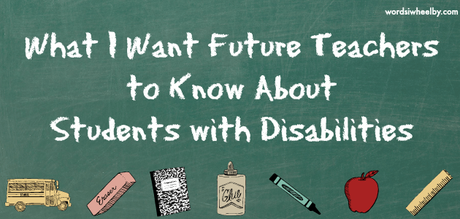
One of my favorite things about writing on disability is that it ignites conversations and sparks perspective shifts (both mine and others) in seemingly endless ways. Recently, I got an email from someone I connected with last year at a conference, and the questions she asked got my wheels turning. I knew I wanted to respond in a blog post. I hope that sharing my answers will in turn open a dialogue for other people to share their thoughts on the subject.
The email read:
"Since we met last year at the AUCD conference, I have completed my PhD and landed my first assistant professor job. I am writing because I would like your input on how to address vocabulary with my students. I am a certified 'special' education teacher. Textbooks for my courses have either 'special' or 'exceptional' in the titles. The laws and legislation include the same vocabulary. From your perspective, how can I address the 'special' vocabulary? What are the three (or more) main concepts/ideas/philosophies you want preservice teachers to know? What advice do you have for me as I prepare future educators? Thank you, Emily. I look forward to hearing from you."
Tackling Terminology
"Special, "exceptional," and other sugar-coated words like this are rampant in professional spheres, legal spheres, and academic spheres. It's euphemistic, a way to avoid mention of disability, because disability is far too often perceived as a dirty word.
From my perspective, every child has unique needs in the classroom. And yet, students with disabilities are still differentiated and given labels for requiring certain adaptations or accommodations. The "special" students have extended time to take tests. The "exceptional" students must take adapted physical education. But doesn't each student have different learning styles and different ways of getting things done? True, not all students have an Individualized Education Plan (IEP) to set forth specific accommodations, but just because the means may be different from a typical student, the end is the same. The test is done. The class is completed.
Moreover, in spite of attempts to avoid calling attention to disability, "special education" has taken on negative social connotations of its own. Unfortunately, though, there is no universally accepted alternative term. I'd suggest "adaptive education" as another option, because it has the most accurate definition: education that is modified to be suitable.
But since "special education" is the term we've got to work with, I feel it's less critical to focus on a language shift, and more important to encourage a mentality shift. Educators should always remember that students who require various forms of special education are equal to all other students. A phrase does not define a whole person.
What Should Future Teachers Know?
This, then, leads to the first idea I'd want educators-in-training to consider. Students in special education programs are going to grow up. I know this sounds obvious to the point of almost being silly, but "special" can be the kind of thing that follows people throughout their lives. Students who have diverse academic needs still deserve to receive an education that both brings them to and meets their fullest potential.
Second, the best kind of education is inclusive education. I'm not entirely denouncing programs that are targeted for students with disabilities, but all students deserve the same opportunities. Segregating students with disabilities from their peers sends the message that differences are bad, and that separation is the norm, and this is an incredibly harmful line of thinking to promote.
Of course, in inclusive classrooms, differences between students of all abilities will be evident from time to time. In cases like these, I cannot stress enough the third thing I hope teachers will heed: please, please do not tokenize students or call them out in front of everyone. I can't tell you how many times teachers called unwanted attention to my disability in unnecessary ways, all the way from kindergarten through college. For instance, teachers would say things like "Everyone stand up, but you don't have to, Emily." Everyone knew I use a wheelchair and it was obvious I couldn't stand up, so why point it out? The best bet is to plan ahead to make an activity work for all of your students so it will run smoothly and you'll avoid encountering accessibility obstacles.
Ways to Educate Educators-in-Training
All teachers start somewhere when it comes to learning about how to accommodate students with disabilities in the classroom. Those who educate future educators are in an incredible position to break the chain of discrimination and inequality, bringing acceptance of disability to all areas of society. I believe the key to ensuring that teachers are prepared is to expose them to an extensive variety of viewpoints on disability. Sure, there are standard textbooks geared specifically towards "special education," but I sincerely urge going beyond them. Read pieces reflecting on educational experiences written by people who are actually disabled. Explain that there are multiple ways that the disability community chooses to identify themselves. Better yet, invite actual disabled people into your class to speak with future teachers and give insight into their experiences! (Hint, hint...I'm available for speaking engagements! 😉 )
Taking all of this into account, the most important piece of wisdom you can impart to future teachers is: if you've taught one student with a disability, then you've taught one student with a disability. All of the training, all of the textbooks, and all of the guest speakers in the world cannot ever encompass the full range of the disability experience, or the experience of teaching someone disabled. And this may sound intimidating. But when you really think about it, what this means is quite simple. Disabled students should be treated and taught like all other students, each who have their own personality, styles of learning, and strengths and weaknesses.
It comes down to this: All students are individuals. All students have differences. All students are human.
